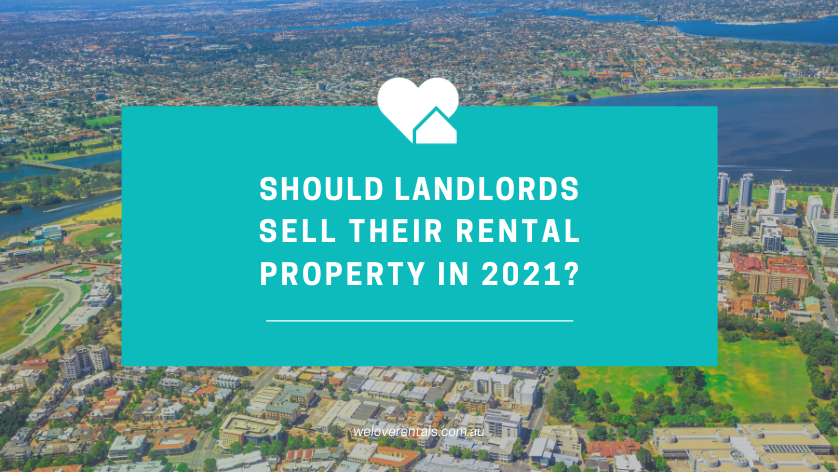
Selling Investment Property – Should You Sell Your Rental In 2021?
Wondering what to consider when selling your investment property?
Deciding to sell a rental property is not a choice landlords should make lightly.
If you’re considering this, your Perth based property management company such as We Love Rentals (and accountant) are the best people to advise you. They have in-depth knowledge of all the relevant factors – most importantly, the financial benefits and the current property market climate!
In this blog post, we’ll run through a quick guide of what to consider before selling your investment property:
- the current rental property market
- selling into the current market
- sell under the right circumstances
- return on investment (ROI).
Book a Free Rental Appraisal Now
The rental property market

Do your research. Typically, the first thing to consider is the current state of the rental market.
Vacancy times/vacancy rates will impact whether it’s best to sell your rental property or continue to let it.
The type of property and its location may also affect your decision.
Vacancy rates and rents are not consistent in every area. Units and houses perform differently, and seasonal factors also affect demand.
You can access some data through industry websites such as REIWA and realestate.com.au. However, your property manager has access to more detailed research and statistics (often not available to the public) and is better equipped to interpret them.
For example; median rents by area, size of the property, and how long comparable properties are taking to rent.
According to SQM research, vacancy rates for Greater Perth are now below 1%.
The Real Estate Institute of WA (REIWA) reports that median rents have improved to around $390 per week for houses and $350 for units.
Gross rental yields may have improved as a result, but it is essential to look specifically at your area and property type.
For instance, units often perform quite differently from houses, and size does matter (2-bedroom units and 3-bedroom homes are usually the most sought-after). Rents also vary from area to area.
Your property manager is best-placed to interpret this data and advise you.
Selling in the current market
Sale prices in Greater Perth have also improved since June 2020, leading many landlords to wonder whether they should sell their rental property. However, median values are still down in comparison to 2019 prices, suggesting caution is advisable.
Given the potential for increased rental income and even more substantial future capital gains, many experts are not recommending landlords rush to sell.
Seeking a rental increase while waiting for the market to improve further may be prudent.
Sell Under The Right Circumstances
In the end, your decision should reflect your personal circumstances.
Significant life changes may make selling your best option. These could include:
- relationship changes
- career changes/retirement
- health issues
- more rewarding investment opportunities.
On the other hand, sometimes holding on to the rental property is the best option, even if landlords around you are selling up.
Consider whether:
- your rental property is providing a healthy ROI and property management fees are reasonable
- you can improve rental returns if you hold on
- circumstances allow you to wait until the market improves
- you have a more rewarding way to invest sale proceeds.
Return On Investment (ROI) & Capital Gains Tax (CGT)
If there are no pressing personal circumstances, the essential ‘to sell or not to sell’ factor in selling your investment property often comes down to current and predicted ROI and capital gains tax (CGT).
Ask your property manager and accountant for advice. Your property manager has the data on overheads and rental income, and your accountant can advise on how predicted rental return impacts your tax and how selling your investment property compares with other investment options.
Consider:
- rental property expenses
- potential rental increases
- costs of selling (commission, advertising, etc.)
- predicted capital gains tax.
What is the Capital Gains Tax?
The Capital Gains Tax is often one of the bigger costs that can apply when it comes time to sell your rental.
Generally, you do not have to pay capital gains on:
- Your main residence, provided that it is not used to make a profit. For example, running a home business, or renting out a room. If it is, only a partial exemption from the capital gains tax may apply.
- A property acquired before September 20, 1985 (when CGT started).
- A property bought through a self-managed super fund (SMSF) with an SMSF home loan, provided that you do not live in it until you’re eligible to receive your pension.
Note: You are only allowed to list one home as your main residence at a time. Any additional homes will be subjected to the full or partial Capital Gains Tax.
To work out your capital gains use the Australian Taxation Office (ATO) guidelines here.
Book a Free Rental Appraisal Now
Can you avoid paying Capital Gains Tax on your rental property?
There are 3 rules that can help property investors reduce their total capital gains. They are:
- the 6-month rule
- the 6-year rule
- the 12-month rule
The 6-month rule
If you acquire a new home before you sell your old one, both homes may be treated as your main residence and will be exempt from the capital gains tax for up to 6 months. To be eligible for this rule with the ATO, you must:
- Live in your old home for a continuous period of 3 months (minimum) in the 12 month period before it sells.
- Not use it to produce an assessable income (e.g. rent) in the 12 month period before it sells.
- List the new home you purchase as your main residence (and treat it as such).
So, landlords who use their main residence to “rentvest” could use this rule to sell and pay no capital gains, upgrade to a better property, and then rentvest this new home once the ‘main residence’ criteria has been satisfied.
The 6-year rule
If you purchase a property and use it as your main residence, then decide to rent it out, the ATO grants you 6 years (from the date you move out) to sell this home and pay no capital gains.
Note: You cannot not list another property as your main residence during the same period (unless you are applying the 6-month rule above).
The 6-year timeframe also restarts each time you move back into your property, so you can both rent and hold your property for much longer, and still sell without paying any capital gains.
The 12-month rule
For most investors, this is the most common (and useful) rule to reduce capital gains.
If you own a property for 12 months or longer you can reduce your Capital Gains Tax by a hefty 50%.
If you own more than one investment property, in addition to your main residence, this is one way to substantially reduce the total capital gains paid on your assets – whether they are rentals, holiday homes, or a home business.
Always speak with your accountant about how much capital gains you can expect to pay, before you make any decisions to buy, rent, sell, or use your primary residence to produce income. They can advise you on the most beneficial course of action for your circumstances!
What should I do next?

If you’re feeling intimidated by the idea of wading through facts and figures, don’t worry! At We Love Rentals, our property managers know how to help landlords formulate the best strategy for their circumstances.
Book a Free Rental Appraisal Now

